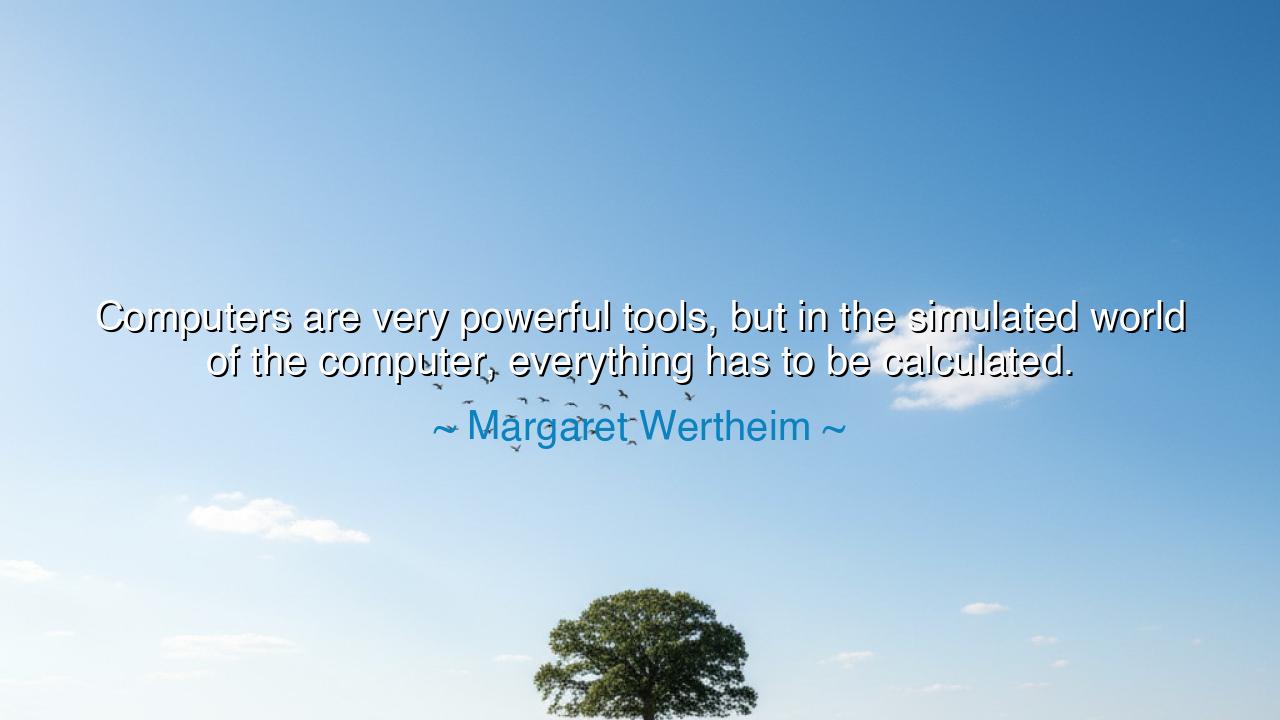
Computers are very powerful tools, but in the simulated world of
Computers are very powerful tools, but in the simulated world of the computer, everything has to be calculated.






“Computers are very powerful tools, but in the simulated world of the computer, everything has to be calculated.” — so declared Margaret Wertheim, a thinker who gazed deeply into the meeting of mathematics and imagination. In her words echoes both admiration and warning — a reverence for the power of computers, and a reminder of their limits. For though these machines can shape vast realms of simulation, weaving worlds from numbers and logic, they remain bound by the iron law of calculation. Nothing within them happens by chance or intuition; every motion, every glimmer of light, every echo of sound is the sum of commands and equations. They create, yes — but only within the walls of certainty.
This saying is not a rejection of technology, but a meditation on its nature. Wertheim invites us to see that the computer’s world, magnificent though it may seem, is a simulated one — a reflection, not a reality. It is built of digits and algorithms, of rules too strict to hold the breath of chaos that animates life. The ancients might have called it a “mirror realm,” bright but soulless, where the logic of gods replaces the intuition of men. For in our living world, not all is measured. A heartbeat skips. A leaf falls not by perfect geometry but by grace. The world of the computer cannot replicate this freedom — it can only approximate it through endless calculation.
Consider, O listener, the story of Alan Turing, the father of modern computing. In his brilliance, he dreamed of machines that could think, that could learn. And yet, in his private writings, he confessed his awe at the human mind, that mysterious force capable of intuition — of leaps beyond logic. His machines could follow instructions flawlessly, but they could not wonder. They could not make the uncalculated leap that births poetry, mercy, or love. Wertheim’s quote thus stands as a bridge between Turing’s dream and his dilemma: the computer is a servant of reason, but the soul of creation remains forever beyond arithmetic.
The power of computers is unquestionable. They can predict storms, simulate galaxies, and map the secret folds of DNA. They can even paint and compose music. Yet beneath all this magnificence lies calculation — vast, tireless, and precise. What they lack is what we take for granted: the trembling uncertainty that makes life beautiful. The sunset that stirs the heart cannot be calculated into existence. The laughter between friends cannot be reduced to data. Even in science, discovery is often born not from computation, but from a spark of intuition, a moment of divine madness that no algorithm could foresee.
But let us not despise the machine. Wertheim does not condemn; she reminds. The computer is a tool — a mighty one — yet it is not the source of truth, only its instrument. It reveals the patterns of nature, but not her soul. We must not mistake the simulation for the world, nor the map for the territory. The ancients warned of hubris — of thinking that by naming the stars, one could rule the heavens. So too must we beware the illusion that by modeling life, we have mastered it. The unquantifiable — beauty, empathy, meaning — still lies beyond the reach of silicon.
The lesson, therefore, is balance. Use the power of the computer, but do not be enslaved by it. Let it extend your mind, but not replace your heart. When you look at the simulations — the perfect graphs, the precise models — remember the imperfect wonder of reality. Walk outside, touch the soil, listen to the rain that falls without formula. Celebrate that you, unlike the computer, can feel awe without needing to calculate why.
So, my children of the digital dawn, remember this teaching: the computer’s strength is in its precision, but your strength lies in your soul. The machine counts; you dream. The machine simulates; you live. Honor both — the logic that builds the bridge, and the imagination that dares to cross it. And never forget that in the great equation of existence, it is not the calculated, but the uncalculable, that gives life its meaning.






AAdministratorAdministrator
Welcome, honored guests. Please leave a comment, we will respond soon